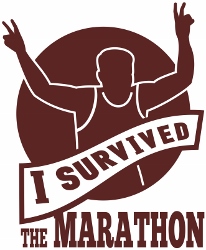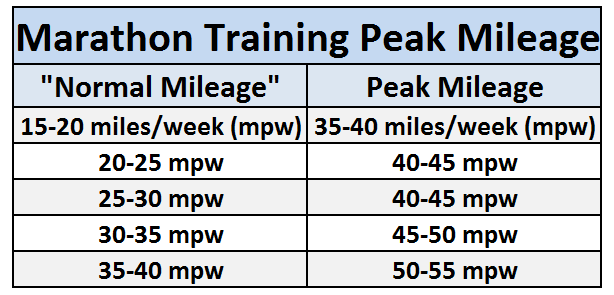The finish line is in sight. Your lungs are burning and every muscle below the waist is on fire.

For hours, you’ve patiently and methodically executed your pacing strategy. The past few months have been solely dedicated to marathon training.
You’ve fueled just the way you practiced. And you ignored the temptation to run too fast, too soon.
The finish line draws closer. It looms ahead of you.
The deafening roar of the crowd somehow fades and all you hear is ragged breathing, heavy footsteps, and the pounding of your heart against ribs.
But then it happens: you cross the timing mat and look up. A weight that’s been sitting on your shoulders for the past six months is lifted when you realize you’ve done it. Your goal time was crushed by minutes.
You’ve just finished a marathon – and achieved the wildest of goals.
Months of sacrifice, fatigue, and soreness have been endured for this single moment in time. And it was absolutely worth it.
***
If you’re like me, the finish of a successful marathon carries with it feelings of awe, pride, and sheer disbelief.
When I crossed the finish line of the Philadelphia Marathon and realized that I accomplished my stretch goal of running under 2:40 (2:39:32 officially), I asked myself, Did I really just do that?!
Of course, I had just done that. And I looked over at my wife as she stood clapping and cheering on the sidelines and mouthed the words I did it as she smiled back at me.
That memory is as vivid and powerful now as it was nearly five years ago.
And I want every marathoner to experience that unmatched feeling of excitement. Because that feeling makes every miserable run worth it in the long, grueling months leading up to the race.
Recently I asked my Twitter community about the advice they’d give a first-time marathoner. Here are some of the responses:
- “Don’t feel bad if it starts to suck at mile 18. That’s normal.”
- “Break the race into segments and only think about the segment that you’re running.”
- “Don’t focus on time. Instead, focus on getting through each mile and crossing the finish line.”
- “It will be a huge learning experience. Take it all in.”
- “Have a plan and stick to it.”
- “The pain of getting through the marathon will be massively superseded by the pride and joy you’ll feel crossing the finish line.”
- “Relax, trust your training, and eat the elephant one bite at a time.”
Some of these are great. Others… not so much. It depends on your goal – whether you’re striving for a time or just to finish.
No matter who you are, this article will explain marathon training so you can prepare properly, reduce your risk of injury, and run your fastest marathon yet.
Whether your goal is qualifying for the Boston Marathon or simply finishing the race, there are certain guidelines that apply to everyone.
And today you’ll learn basic and more advanced marathon training strategies that you can immediately apply in your own training. Plus, we’ll see why the marathon is actually so hard and cover common questions.
With better preparation, you’ll have a much more positive marathon experience.
And, you’ll run a lot faster!
Why is the marathon so difficult?

At 26.2 miles, the marathon is the longest race that’s still completed by a significant number of runners every year.
In fact, in 2014 there were over 550,000 marathon finishers in the United States alone according to Running USA.
Completing a marathon is becoming commonplace. But while it’s not so rare to run 26.2 miles, that doesn’t make the distance any less formidable.
The race itself is challenging for many reasons:
- The sheer distance! Most of us never run this long in training.
- The body only stores about 2 hours or 20 miles worth of carbohydrate – making carb-loading necessary
- The surface is hard and uniform, making all that road running jarring on the body (especially if you’re used to trails)
But the marathon isn’t difficult just because of these reasons. The training itself is also challenging!
No other race requires so much preparation – not just to run well, but also to limit injuries and ensure you can finish 26.2 miles.
You’ll be:
- Running higher mileage than usual
- Running longer workouts than you’re likely used to completing
- Covering longer long runs than ever before
With these training demands, it becomes critical to make sure you’re even ready to start training for a marathon.
And of course, we’re not even discussing the recovery that’s needed after you finish the race. Unlike a half marathon, a marathon requires much more strict attention to recovery for a host of reasons:
- Muscle damage (the obvious culprit) is high, especially after a hilly or net downhill race
- The heart can experience temporary damage, especially if you’re not trained properly
- The endocrine system is thrown for a loop (example: testosterone levels plummet after running 26.2 miles)
- Immune response is suppressed
Recovery takes longer than a few days. In fact, even with proper marathon recovery, you won’t be 100% back to normal for 3-4 weeks.
Therefore, we must respect the marathon. It is an unforgiving race that will chew you up and spit you out if you’re unprepared.
Marathon Training Essentials
Let’s dive into the training ingredients that are absolutely essential to preparing to race 26.2 miles.
See how these fundamentals change slightly for various goals, like a sub-3 marathon:
Or, a sub-4 marathon:
Now let’s look at the common training ingredients that will help you run a fast marathon.
#1 Relatively High Mileage
During marathon training, your overall weekly volume should be higher than what you’re used to during “normal” training.
A good goal is to run about 10-30% more miles during your peak training (this rule breaks down with very low mileage, however). Here’s a rough guide:

Since the marathon is 99% aerobic (and since it’s more than 26 miles), a relatively high mileage training approach is one of the best indicators of success at this distance.
And if someone preaches on about “junk miles” just point out that the best marathoners in the world run about 20 (or more!) miles per day.
If they’re focusing on high mileage, we should too!
#2 Run Long – Every Week
The long run is the most important and specific run to the marathon. So it must be prioritized. I just can’t understand many of the free marathon training plans you can download online that have a cutback long run every other week.
Why sacrifice the most important run of the week? Jay Johnson agrees.
Instead, commit to a long run every week. They should build by about a mile every 1-2 weeks with a cutback of 2-5 miles every 3-5 weeks.
If you don’t have the time to safely increase your long run to about 20 miles before a marathon, then you’re simply not ready to train for a marathon yet.
For more on long runs, check out our guide to the long run.
#3 Focus on Training, Not Racing
We previously looked at David’s training for his marathon and noticed he raced early in the season and often. This isn’t smart – the intensity is substantial for early in a marathon season.
There needs to be a balance between intense, fast running and aerobic, slower (note: I said slower – not slow) running.
If there’s too many races – particularly short and fast races – the drawbacks are numerous:
- You limit your ability to put in more miles
- The risk of peaking too early before your race is higher
- You sacrifice race-specific workouts in favor of non-specific races
Instead, keep your racing to 1-2 tune-ups in the 10k – half marathon range roughly 4-8 weeks out from your goal marathon.
Don’t sacrifice your top goal by focusing on lesser goals.
#4 Run Smart Workouts
Too many runners are blasting short repetitions on the track at 5k pace (or faster) during training. While a modest amount of intensity in the mid-late season can help with efficiency and power, it’s not a priority.
You’ll encounter a host of problems if you run too fast, too often, too early in a marathon cycle:
- Fitness will peak early and fizzle out later in the season
- Marathon-specific workouts are sacrificed (and therefore, the ultimate goal is compromised!)
- Injury risk increases (with higher mileage, this becomes a double whammy of risk)
Instead, focus on aerobic workouts like:
- Steady-state runs
- Progressions
- Tempo workouts
- Marathon-pace runs
These workouts best prepare runners for the specific demands of running a marathon.
#5 Patience
You must be ready to train for a marathon in the first place. If you’re running 10 miles per week with a 4-mile long run, then you’re simply not ready. Respect the marathon.
For exactly how to know when you’re ready to even begin marathon training, this article shows you what’s necessary before you start training.
It’s also helpful to keep in mind that success at the marathon distance often takes many attempts. Many runners have a sub-par (and that’s putting it mildly!) first marathon experience.
But with some tenacity and a long-term perspective, they rebound for an enormous personal best and a much more rewarding race.
If at first you don’t succeed, simply try, try again.
Marathon Training Q&A
Have more specific questions about the marathon?
Well, you’re in luck! Soon I’ll be opening our Team Strength Running coaching program which gives you access to me as your coach.
Every month, I host a live video webinar where you can ask me anything about marathon training, qualifying for Boston, fueling for 26.2 miles, and other strategies for running your fastest marathon.
We don’t open too often, so sign up here to be the first to get notified.
The program includes:
- A team of other runners just like you to share stories, get accountability and inspiration, and meet up for runs
- Gear and program discounts, bonus interviews, and more resources
- A coach to answer your questions, give feedback and guidance, and provide you the support you need
- The full training plan library with 30+ plans for any level of runner
- Ongoing education with a new expert interview every month
Get the details here and I’ll send you more info as soon as the team opens for new enrollments!